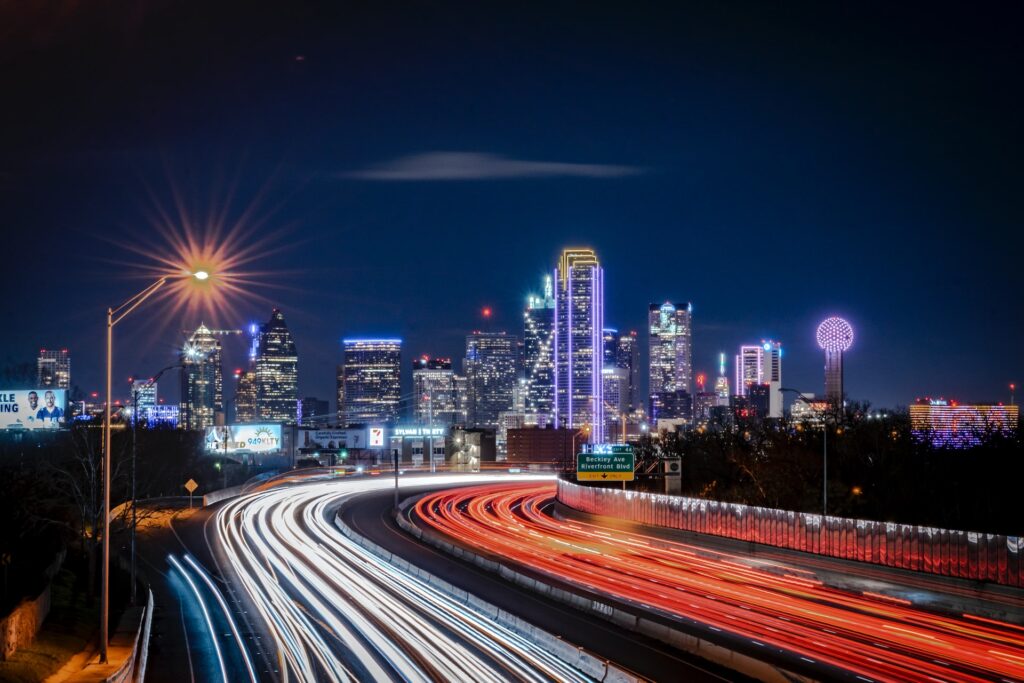The Texas Department of Transportation (TxDOT) Crashes and Injuries Statistics documented 324 fatal crashes and 352 deaths in Dallas county. In 2021, Dallas ranked second in the highest number of road accidents at 55,634. In one incident, authorities shut down Interstate 30 due to a multiple-vehicle collision.
Consequently, several types of auto accidents happen in Dallas. For instance, a pickup truck improperly turned at 300 S. Marsalis Avenue. Unfortunately, the hit-and-run incident led to the victim’s death.
Another accident involved a head-on collision at Castle Drive. According to the Garland Police Department, a Dodge pickup truck crashed into an SUV, causing the death of a 13-year-old passenger. Police officers also stated that the driver had previous DUI charges against them.
Connect with a Dallas law firm or car accident attorney if you have been in a motor vehicle crash.
They can negotiate with
What To Do After a Car Accident in Dallas, TX
All parties involved in a car accident should remain at the scene. Section 550.021 of the Texas Transportation Code (Code) requires operators to stop their vehicles in case of a car crash. Otherwise, they may go to prison or pay fines.
You may move to a safe place and check on other parties for common and serious injuries. Section 550.023 of the Code states that drivers should exchange information. Here are some of the details you need to provide:
- Name and address
- Vehicle registration number
- Insurance details
- Driver’s license
You should call 911 to receive immediate medical attention. The dispatchers will send paramedics and law enforcement to respond to the incident. The Dallas Police Department will also investigate and prepare a police report. The crash report will include the drivers’ contact information and
Talking with other drivers should stop at exchanging information. It would help if you refrained from discussing liability with them. For example, if you were one of the drivers in a wrong-way crash, do not explain how the accident happened. You might say something incriminating, which could hurt your case later.
It also helps to study the scene and take down notes. Take photos and videos, if you can. They can show valuable evidence like tire tread marks, damaged doors, and deployed airbags.
Although Dallas, Texas, follows the at-fault system, you should still inform your
We also recommend hiring a personal injury lawyer who can inform you about your rights. They can collect evidence, negotiate with adjusters, and provide legal representation.
Texas Road Safety Laws To Minimize Accidents
Drivers in Dallas, Texas, should know the road safety laws, including the Move Over or Slow Down Law. Section 545.157 of the Code requires drivers to drop their speed to 20 mph or below when approaching emergency vehicles. These include tow trucks, TxDOT vehicles, and other utility vehicles.
Drivers shall also vacate the lane closest to the said vehicles. Failure to follow the Move Over or Slow Down Law can result in a fine of up to $2,000.
In March 2017, Texas passed House Bill No. 62 or the Alex Brown Memorial Act (Act). It amended Section 521.161 of the Code. The Act requires anyone applying for a driver’s license to know the effects of distracted driving, such as using a mobile phone.
Section 552.003 of the Code states that drivers should yield to pedestrians if there are no traffic control signals. They should also stop their motor vehicles if the pedestrian is already halfway on crossing the road. Violators of this law may pay up to $500. They can also render 30 hours of community service.
Section 545.413 of the Code requires drivers to wear seatbelts. It aims to prevent fatal car accidents. The state imposes a fine of up to $200 on violators of the Seatbelt Law. However, the driver may raise several defenses, including the following:
- A medical illness prevents them from wearing a seatbelt;
- A duty from the United States Postal Service (USPS), a newspaper company, or a utility company needing frequent entry into and exit from the vehicle; and
- They operate a farm vehicle weighing less than 48,000 pounds.
Did you know?
Sharing any accident-related information on social media could harm your claim. Social media and car crash recoveries do not mix well, whether on TikTok, Instagram, or Facebook. Hence, trending posts do not necessarily guarantee a large compensation.
Contact Dallas Car Accident Lawyers
Check The Personal Injury Center if you need a legal resource on personal injury claims in north Texas and other regions. We have a database of lawyers to help you recover accident claims for your medical bills and repair costs. They could also help you reimburse funeral costs if you lost a loved one. Book a free consultation today!
In an at-fault state like Texas, it is essential to identify who is liable for the accident. Figure this out with the help of a Dallas, TX, personal injury lawyer and get fair compensation for your injuries
FAQs on Car Accidents in Dallas, TX
What is the minimum coverage amount under Personal Injury Protection (PIP)?
Section 1952.153 of the Texas Insurance Code does not require an insurer to provide PIP exceeding $2,500 for each person.
What are your duties if you hit an unattended vehicle in Dallas, Texas?
Section 550.024 of the Code states you should find the owner of the unattended vehicle. If you cannot find the driver or owner, leave a note containing your name, address, and details about the incident.
What is the average cost of a car accident?
A fatal auto crash can cost up to $1,750,000. In disabling accidents, injured persons may spend an average of $101,000.



